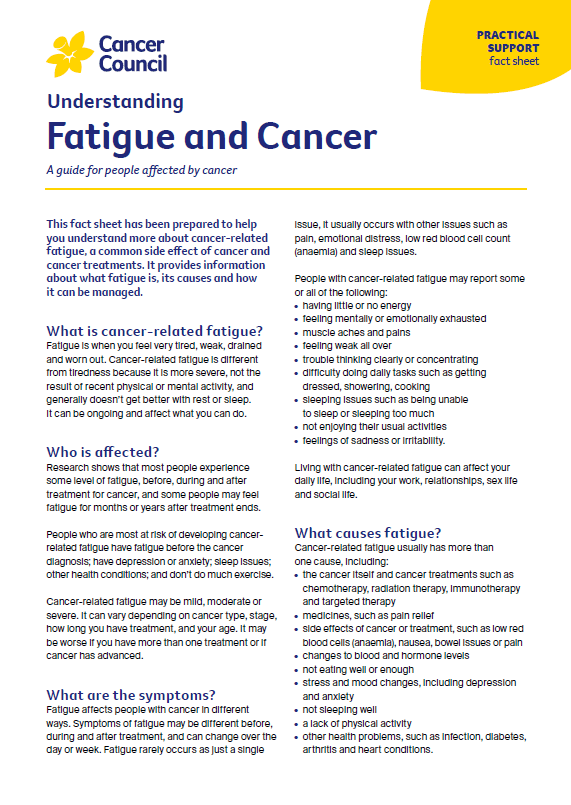Fatigue
A common side effect of treatment is feeling extreme and constant tiredness. This is known as fatigue. It is different to normal tiredness because it usually doesn’t improve with rest. Fatigue can be caused by treatment side effects that reduce the number of red blood cells (anaemia) or that affect your appetite.
How to manage fatigue
- Eat a wide variety of foods. See a dietitian for advice tailored to you.
- Plan ahead for when you feel too tired to cook. Buy frozen meals from the supermarket or prepare food in advance and store it in the freezer.
- Cook in the morning when you are less likely to be tired.
- Buy groceries online instead of going to the shops.
- Ask for and accept offers of help with shopping and cooking from others.
- Use apps such as CanDo to coordinate offers of help.
- Keep snacks such as wholefood muesli bars, dried fruit, nuts and wholegrain crackers in handy locations, e.g. in your bag or car. This will allow you to keep your energy levels up if you have unexpected delays.
- Discover new light meal and snack ideas.
- Use home delivery meal companies or services that bring pre-prepared food to you. Or try companies that deliver ingredients with recipes that you can cook at home yourself.
- Do regular exercise to help improve fatigue and appetite.
- Eat with others to make meals as enjoyable as possible, particularly if you are feeling too tired to eat.
- For more on this, see our general section on Fatigue and cancer.
→ READ MORE: Managing lowered immunity
Podcast: Managing Cancer Fatigue
Listen to more of our podcast for people affected by cancer
Video: Eating well after a cancer diagnosis
More resources
Jacqueline Baker, Senior Oncology Dietitian, Chris O’Brien Lifehouse, NSW; Lauren Atkins, Advanced Accredited Practising Dietitian, OnCore Nutrition, VIC; Dr Tsien Fua, Head and Neck Radiation Oncology Specialist, Peter MacCallum Cancer Centre, VIC; Rosemerry Hodgkin, 13 11 20 Consultant, Cancer Council WA; Clare Hughes, Manager, Nutrition Unit, Cancer Council NSW; John Spurr, Consumer; Emma Vale, Senior Dietitian, GenesisCare, SA; David Wood, Consumer.
View the Cancer Council NSW editorial policy.
View all publications or call 13 11 20 for free printed copies.

